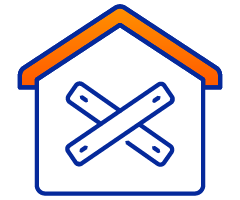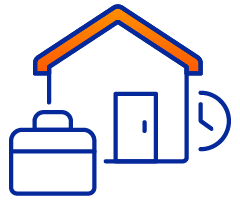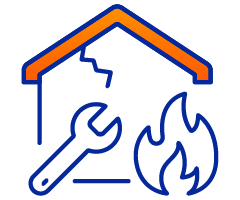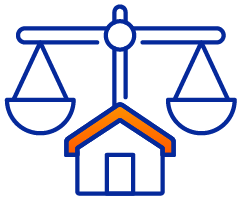Start Here
Homepage Bottom Form
We will get back to you as soon as possible.
Please try again later.
Temporary Housing & Rental Tips After a Fire
🏠 Temporary Housing & Rental Tips After a Fire
Created by House Fire Solutions – Helping Homeowners Recover Comfortably and Confidently
After a house fire, one of the first major challenges is
where to live while repairs are underway.
This guide gives you
practical tips, checklists, and insider advice
for finding safe, affordable, and insurance-approved temporary housing after a fire.
🚨 1. Immediate Steps (Within 24–48 Hours)
Goal: Secure safe lodging and start your insurance claim quickly.
✅ Checklist:
- Contact your insurance company immediately and open a claim.
- Ask if your policy includes ALE (Additional Living Expenses) coverage — this pays for temporary housing.
- Request written authorization from your adjuster before signing any leases or hotel contracts.
- Keep all receipts for lodging, meals, transportation, and pet boarding.
- Notify your mortgage company or landlord about the fire and your temporary relocation.
- Contact House Fire Solutions for help coordinating vetted housing and ALE reimbursement support.
💡 Pro Tip: Most ALE policies cover “reasonable” temporary housing comparable to your previous home — not luxury upgrades, but safe, comfortable spaces.
🏨 2. Short-Term Housing Options (First Few Weeks)
Goal: Find safe, flexible, and nearby accommodations while damage is assessed.
🔹 Options to Consider:
- Hotels & Extended-Stay Suites:
- Best for the first few weeks while inspections happen.
- Ask if your insurer has a preferred vendor (like ALE Solutions or CRS Temporary Housing).
- Look for units with kitchenettes and laundry facilities.
- Corporate or Furnished Apartments:
- Great for 1–3 month stays.
- Includes furniture, utilities, and short-term flexibility.
- Usually arranged through insurance partners.
- Family or Friends:
- May be easiest emotionally, but document your stay.
- Insurers can reimburse hosts for fair lodging value if agreed in advance.
- Temporary Housing Companies:
- Companies like ALE Solutions, CRS, or Hotel Engine specialize in insured relocations.
- They handle paperwork and direct billing to insurance adjusters.
📎 Typical Duration: 2–6 weeks (depending on claim progress and home safety status).
🏘️ 3. Mid-Term Housing (1–6 Months)
Goal: Move into stable housing while restoration and rebuilding occur.
🔹 Best Options:
- Short-Term Rentals:
- Lease a fully furnished home or apartment month-to-month.
- Make sure lease terms allow for early termination once repairs are done.
- Verify that utilities and internet are included.
- Corporate Housing Providers:
- Offer full furniture, linens, and utilities.
- May offer direct insurance billing and flexible terms.
- Modular Homes or Mobile Units:
- Some restoration firms provide temporary housing units placed on your property.
- Ideal if you want to stay near your rebuild project.
💡 Pro Tip: Ask your adjuster about “Loss of Use” coverage — it can include rent, parking, utilities, laundry, and increased commuting expenses.
🏡 4. Long-Term Rental (6+ Months)
Goal: Secure comfortable, insurance-approved living while full rebuild occurs.
✅ Tips:
- Get pre-approval from your adjuster for long-term lease terms and rent limits.
- Review your policy ALE cap (usually 12–24 months or a dollar limit).
- Keep all rental agreements in writing — insurance may not cover verbal deals.
- Ask landlord to include furnishings or request reimbursement for essentials.
- Save every receipt for rent, utilities, deposits, and furniture purchases.
- Keep proof that your primary residence remains uninhabitable (contractor or inspector letter).
🧾 5. Insurance Reimbursement Tips
Goal: Get fully reimbursed for your temporary living expenses under ALE coverage.
✅ Do:
- Track every expense — hotel, meals, laundry, fuel, pet boarding, storage, utilities.
- Keep itemized receipts — credit card statements aren’t enough.
- Submit weekly or monthly expense reports to your adjuster.
- Compare current living costs vs. pre-fire baseline (your insurer pays the difference).
- Save copies of all adjuster emails confirming coverage.
🚫 Don’t:
- Pay for long-term housing without insurer approval.
- Assume the insurer will reimburse cash payments to friends/family.
- Forget to factor in taxes, deposits, and pet fees.
💡 Pro Tip: Ask your adjuster if they can pay the landlord or hotel directly to avoid out-of-pocket delays.
🐾 6. Family, Pets & Comfort Considerations
Goal: Make sure your temporary home meets your family’s needs.
✅ Checklist:
- Ensure the unit is safe, clean, and close to work/school.
- Confirm pets are allowed — many insurers cover pet-friendly units.
- Keep school documentation for temporary address changes.
- Choose a location near groceries, pharmacies, and healthcare.
- Notify mail carriers and delivery services of your new address.
- Pack essentials: ID, insurance documents, medications, and emergency supplies.
💡 Pro Tip: Request a storage unit allowance for your undamaged belongings — it’s often covered under ALE.
📦 7. Furniture & Household Items
Goal: Recreate a livable space with essentials.
✅ Checklist:
- Request replacement furniture reimbursement (bed, table, sofa).
- Rent or buy temporary appliances if the rental doesn’t include them.
- Use furnished rentals to save time and storage costs.
- Ask insurer if moving and storage costs are reimbursable.
- Keep all receipts for setup costs, deposits, and utilities.
💵 8. Cost-Saving Tips
Goal: Stretch your ALE funds wisely.
✅ Smart Moves:
- Choose housing comparable to your prior home — not an upgrade.
- Negotiate discounted monthly rates with hotels or landlords.
- Use extended-stay discounts for multi-week bookings.
- Share meals or utilities if living with relatives.
- Avoid duplicate rent (home + temporary).
💡 Pro Tip: ALE coverage stops once your home is livable again — even if finishing touches remain.
📑 9. Questions to Ask Your Adjuster
- What is my ALE coverage limit (dollar and time)?
- Can I choose my own rental, or must it be approved?
- Are deposits and application fees covered?
- What happens if repairs take longer than expected?
- Can you direct pay my landlord or hotel?
- What documentation do you need for reimbursements?
- Are pet fees and storage covered?
- Can you help with housing placement services?
💡 10. House Fire Solutions Pro Tips
✅ Always keep
copies of every housing document.
✅ Ask your adjuster for
written coverage confirmation before signing anything.
✅ Don’t rush — choose a location that supports your family’s comfort and recovery.
✅ Document all communications — calls, emails, texts — for claim support.
✅ Let House Fire Solutions help connect you to
vetted housing and relocation specialists.
💬 Final Advice from House Fire Solutions
A fire disrupts your life — but safe, stable housing restores your foundation.
Plan smart, keep records, and let trusted professionals help guide your recovery.
Our Team Helps You Navigate Insurance, Restoration, and Rebuilding
It is a long established fact that a reader will be distracted by the readable content of a page when looking at its layout.

Board-Up
Our Network of Board Up Specialist Will Secure your property fast

Temp Housing
We'll Help You Find Safe Shelter while you recover

Public Adjusters
Our Network of Fire Damage Adjusters Will Fight Help for a fair insurance payout

Investors
Our Partner Specializes in Buying Fire Damaged Homes So you Can Sell your home as-is

Content Cleaning
Restore what matters most

Restoration
Bring your home back to life

Attorneys
We have a network of Protect your rights and claims

Mental Health
Support for you and your family
Want To See If We Can Help You
If you'd like to speak with us today about purchasing Social Security, Personal Injury, Workers' Compensation or Employment Law Leads.
Homepage Bottom Form
We will get back to you as soon as possible.
Please try again later.